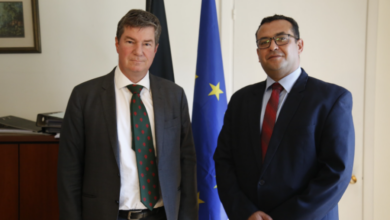“Connecting Delta Cities," a 42-minutes documentary screened on Saturday at Cairo University’s Faculty of Agriculture, is part of the Wadi Environmental Sciences Centre’s (WESC) Film Series. It aims at raising public awareness on the direness of the effects of global warming and rising sea levels currently affecting Delta Cities throughout the world.
Currently, two-thirds of the world’s largest cities are located in delta areas and coastal zones that are directly affected by climate change. Regular flooding, irrigation and sewage problems are targeting these coastal cities worldwide.
The documentary, which gathers testimonies of experts and local residents, tackles the plight of various delta cities like Alexandria, New York, Jakarta and Rotterdam in an attempt to depict how each city is effected in its own unique way.
Konrad Steffen, the Director of the Cooperative Institute for Research in Environmental Sciences (CIRES), provides an analysis of Greenland’s ice sheet. He predicts that the Earth’s sea level will continue to rise to at least one and a half meters by the year 2100.
By analyzing the particular phenomena attacking each coastal city, it becomes obvious that each city has its own dilemmas to deal with, related to its cultural habits, political structure and history. This is why it appears so complex to come up with a comprehensive strategy to enforce climate adaptation.
In Alexandria, the rising sea level has already created chemical leakages into the city’s drinking water supplies, as well as causing major issues with the sewage system.
“Blockages occur every day,” said a local female resident of Alexandria. “Water pressure is low and most of the time it goes away completely, forcing us to fetch water from the river and bring it back home in bottles.”
The chemical disturbance also has a devastating effect on the Mediterranean sea life, particularly fish, the main source of revenue for many of the residents.
“Sometimes I leave my fishnet in the water for four days in a row and I struggle to get enough fish to feed my own family,” said a local fisherman. “Our lakes and water supplies smell like chemicals,” he adds.
Mohamed El Raey, professor of Environmental Studies at the University of Alexandria, underlines how the rise in the sea level is expected to drastically disturb tourism in Egypt.
“In the summertime, the beach is completely covered with people, you can’t see one free spot of sand,” he states. “But if the water continues to rise the people are going to desert the beaches. That’s why we are putting a constant pressure on the decision-makers to expand Alexandria to higher level areas before it’s too late.”
In New York, Malcom Bowman, professor of Oceanography, Marine and Atmospheric sciences, says that that one of the first “victims” of the rise of sea level in New York is the subway.
“In 1992, the seawater rose and flooded the subway stations,” says Bowman. “And because saltwater conducts electricity, the whole subway had to be shut down. The subway will be affected more often by the rise of the sea level in the future.”
Director of Public Relations at the Metropolitan Transportation Authority (MTA) Ernest Tollerson, explains that “as we build new facilities, we take the rise of the sea level into account. Although the US government is focusing more on global warming and greenhouse gases right now, climate adaptation needs to be solved in a perennial way.”
He adds that climate adaptation needs to be incorporated into people’s lives as soon as possible in order to maintain the standards of modern living.
The New York Stock Exchange (NYSE) entrance is less than a meter off the ground and in case of a serious flood, the economic consequences would be extremely serious. Bownan explains that this could be addressed by raising the entrance to a meter high.
In Jakarta, the effects of climate change are extreme and already affect millions of lives.
Hasanuddin Abidin, the Vice Rector at the Institut Teknologi in Bandung, explains that “close to the shore, some areas are already rising by 25cm each year. The drainage systems can’t handle this regular rise and at high tide, 70 percent of Jakarta ends up being flooded.”
In an attempt to alleviate the matter, the government and various environmentalists have seen to setting up barriers to deflect the water in an attempt to control the rising tides. It has also become common practice for people in villages to keep raising the foundations on which their houses are built.
“This is not an issue that has to be dealt with in the future,” states one of the locals. “It’s our everyday reality. We are already poor and it is becoming impossible to even carry out our everyday activities.”
Environmentalists in Indonesia are pushing the government to take real action, and not a “band-aid” type of momentary action to solve the problem
“We can’t just keep building the houses higher and higher,” states Abidin. “This needs proper research and we will need innovative technology.”
Rotterdam, on the other hand, is quite unique. The city already has a system of large dikes to contain the water overflow. The governments and various environmental groups are putting together research plans to further innovate the city.
Pier Vellinga, professor at Wageningen University, states that new facilities will all be built at six meters above sea level in order to protect the old city's large barriers in the North Sea and against the rivers.
The city is also implementing "Green Roofs" on a large scale, which absorb rainwater and lower urban air temperatures and carbon dioxide levels.
“By developing our research and using the examples of other cities, we can produce more robust cities that can withstand future climate changes,” Vellinga says.
Although each of these four cities is at a different development stage, it is obvious that the ones that need immediate attention are those which suffer the most from lack of awareness.
Hassan Abou Bakr, professor of Agriculture at Cairo University animated the discussion that followed the screening of the documentary, and offered some insights particular to the issue in Egypt. He stated that local environmentalists are struggling to convince political powers to add climate adaptation to their agenda.
“In light of the recent revolution there has never been a more suitable timing to get the word out,” he stated. “The old regime was not interested in asking scientists and specialists’ opinions on climate change. I hope that youth empowerment will help bring the issue to the forefront.”




